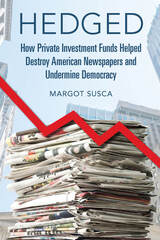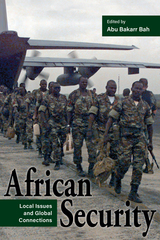
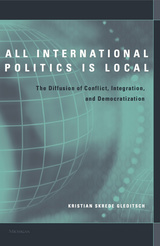
How does regional interdependence influence the prospects for conflict, integration, and democratization? Some researchers look at the international system at large and disregard the enormous regional variations. Others take the concept of sovereignty literally and treat each nation-state as fully independent. Kristian Skrede Gleditsch looks at disparate zones in the international system to see how conflict, integration, and democracy have clustered over time and space. He argues that the most interesting aspects of international politics are regional rather than fully global or exclusively national. Differences in the local context of interaction influence states' international behavior as well as their domestic attributes.
In All International Politics Is Local, Gleditsch clarifies that isolating the domestic processes within countries cannot account for the observed variation in distribution of political democracy over time and space, and that the likelihood of transitions is strongly related to changes in neighboring countries and the prior history of the regional context. Finally, he demonstrates how spatial and statistical techniques can be used to address regional interdependence among actors and its implications.
Kristian Skrede Gleditsch is Assistant Professor of Political Science at the University of California, San Diego.
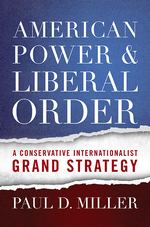
Paul D. Miller offers a tough minded critique of recent trends in American grand strategy. He rejects retrenchment but also the excesses of liberal internationalism. He prescribes a conservative internationalist grand strategy to preserve the American security and leadership in the world while avoiding overstretch.
Originally written before the 2016 US presidential election, this first paperback edition contains a new preface that repositions the book’s argument for the Trump era. Miller explains why President Trump’s nationalist vision for American grand strategy damages US interests and world order. Miller blends academic rigor with his experiences as former member of the National Security Council and intelligence community to offer prescriptions for US grand strategy. He advocates for narrowing regional priorities and focusing on five strategic objectives: balancing against the nuclear autocracies, championing liberalism to maintain a favorable balance of power, thwarting the transnational jihadist movement, investing in governance in weak and failed states, and strengthening homeland security.
This book is a must read for scholars and students of international affairs and for anyone who is concerned about America’s role in the world.
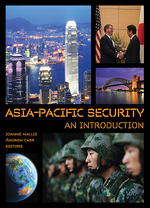
This new textbook gathers an international roster of top security studies scholars to provide an overview of Asia-Pacific’s international relations and pressing contemporary security issues. It is a suitable introduction for undergraduate and masters students' use in international relations and security studies courses. Merging a strong theoretical component with rich contemporary and historical empirical examples, Asia-Pacific Security examines the region's key players and challenges as well as a spectrum of proposed solutions for improving regional stability. Major topics include in-depth looks at the United States' relationship with China; Security concerns presented by small and microstates, the region's largest group of nations; threats posed by terrorism and insurgency; the region's accelerating arms race and the potential for an Asian war; the possible roles of multilateralism, security communities, and human security as part of solutions to regional problems.
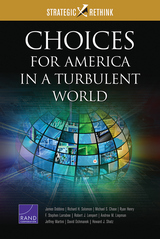

Jones focuses on the progressive development of international law to disclose an underlying code of ethics that enjoys broad support in the world community. Unlike studies that concentrate on what others think that states ought to do, Code of Peace analyzes what states themselves consider proper behavior. Using history as both narrative and argument, Jones shows how the existing ethical code has evolved cumulatively since World War I from a complex interplay between theory and practice. More than an abstract treatise or a merely technical analysis, Jones's study is grounded in the circumstances of war and peace in this century. Treaties and agreements, she argues, are forging a consensus on such principles as human rights, self-determination, and cooperation between states. Jones shows how leaders and representatives of nations, drawing on a rich heritage of philosophical thoughts as well as on their own experiences in a violent world of self-interested conflict, have shaped their thought to the taming of that world in the cause of peace. That is the striking thing about this code: states whose relations are marked by so frequent a recourse to war that they can fairly be called "warlords" have created and pledged themselves to a code of peace.
The implications of Code of Peace for establishing a normative foundation for peace are profound. Historically sound and timely, impeccably researched and elegantly written, the book will be of immediate and lasting value to anyone concerned with the stability of the modern world.
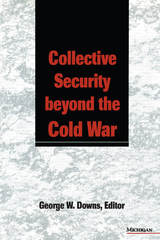
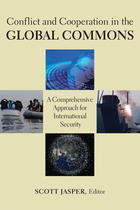
More than ever, international security and economic prosperity depend upon safe access to the shared domains that make up the global commons: maritime, air, space, and cyberspace. Together these domains serve as essential conduits through which international commerce, communication, and governance prosper. However, the global commons are congested, contested, and competitive. In the January 2012 defense strategic guidance, the United States confirmed its commitment “to continue to lead global efforts with capable allies and partners to assure access to and use of the global commons, both by strengthening international norms of responsible behavior and by maintaining relevant and interoperable military capabilities.”
In the face of persistent threats, some hybrid in nature, and their consequences, Conflict and Cooperation in the Global Commons provides a forum where contributors identify ways to strengthen and maintain responsible use of the global commons. The result is a comprehensive approach that will enhance, align, and unify commercial industry, civil agency, and military perspectives and actions.
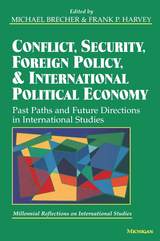
No study of international relations is complete without consideration of foreign policy processes and an understanding of state security, conflict in global politics, and the relationship between the world economy and international behavior. Conflict, Security, Foreign Policy, and International Political Economy: Past Paths and Future Directions in International Studies consists of twelve original essays that point out the strengths and weaknesses of current approaches in these research areas as well as suggest agendas for future research.
Frank P. Harvey is Professor of Political Science and Director of the Centre for Foreign Policy Studies at Dalhousie University.
Michael Brecher is the R.B. Angus Professor of Political Science at McGill University and past president of the International Studies Association.
Millennial Reflections on International StudiesThis volume is part of the Millennial Reflections on International Studies project in which forty-five prominent scholars engage in self-critical, state-of-the-art reflection on international studies to stimulate debates about successes and failures and to address the larger questions of progress in the discipline.
Other paperbacks from this project:
Realism and Institutionalism in International Studies
Evaluating Methodology
Critical Perspectives in International Studies
The full collection of essays is available in the handbook Millennial Reflections on International Studies.

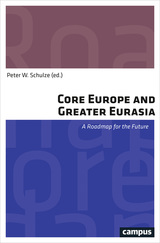
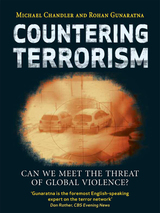
Five years after 9/11, we question whether or not terrorist activity has actually decreased. Terrorist networks still span the globe and, some argue, they are more powerful than ever. Yet in this era of rigid security and U.S.-led wars on multiple continents, countries are at odds about how to deal with the looming threat—and chaotic aftermath—of terrorist acts. In Countering Terrorism, Rohan Gunaratna and Michael Chandler sift through political commentary, military maneuvering, and the tangled web of international diplomacy to put us on alert: The world has missed a prime opportunity to crush terrorism.
Chandler and Gunaratna are among the world’s foremost experts on international terrorism, having logged between them over forty years of firsthand experience in the field and planning rooms, analyzing and dealing with an unceasing succession of terrorist threats and conflicts. Chandler and Gunaratna employ their unparalleled expertise to probe the catastrophic attacks so indelibly seared into the history of the early twenty-first century, from 9/11 to the Madrid bombings to deadly strikes in Afghanistan, Iraq, Pakistan, Palestine, and elsewhere. They ask the hard questions we never hear on nightly newscasts: Why has the overall response to terrorism after 9/11 been “so abysmal, slow, piecemeal, and to a large extent far from effective?” Why have some countries, despite international criticism, disregarded universally accepted humanitarian norms when handling the prosecution of terrorist suspects?
By allowing politics to trump the need for trans-national cooperation, the authors contend, the international community—and particularly the United States—has squandered an opportunity to combat terrorism with a united and powerful force. Thus what should have been a watershed moment in international relations vanished as effective long-term policies were shunned in favor of short-term political expediency.
From arguing the Iraq War has been a “strategic defeat” to Afghanistan’s struggle against the Taliban to the rapidly growing geopolitical role of Iran, Countering Terrorism investigates the reality of the changes that followed the bombings and attacks and examines global terrorism from every angle, including the social and economic underpinnings of terror networks. Scholars, experts, and citizens have appealed for a re-evaluation of today’s increasingly ineffective “War on Terror” policies, and Chandler and Gunaratna answer this call with clear and concise proposals for future dealings with global terrorism.
The projected end results of the wars, terrorist attacks, and political upheavals tearing nations apart today are rarely anything but bleak. But Countering Terrorism challenges today’s chaotic status quo, offering penetrating analysis and a radically new perspective essential to grappling with the complexities of terrorist activity and counterintelligence today.
"A timely book that fills a lacuna in the counter-terrorism literature and has to be on the bookshelf of any decision-maker, scholar, student and anyone who is interested in understanding the current and the future trends of international terrorism and the strategies that has to be taken to combat this threat."--Dr. Boaz Ganor, author of The Counter-Terrorism Puzzle: A Guide for Decisionmakers
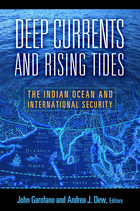
The Indian Ocean region has rapidly emerged as a hinge point in the changing global balance of power and the geographic nexus of economic and security issues with vital global consequences. The security of energy supplies, persistent poverty and its contribution to political extremism, piracy, and related threats to seaborne trade, competing nuclear powers, and possibly the scene of future clashes between rising great powers India and China—all are dangers in the waters or in the littoral states of the Indian Ocean region.
This volume, one of the first attempts to treat the Indian Ocean Region in a coherent fashion, captures the spectrum of cooperation and competition in the Indian Ocean Region. Contributors discuss points of cooperation and competition in a region that stretches from East Africa, to Singapore, to Australia, and assess the regional interests of China, India, Pakistan, and the United States. Chapters review possible “red lines” for Chinese security in the region, India’s naval ambitions, Pakistan’s maritime security, and threats from non-state actors—terrorists, pirates, and criminal groups—who challenge security on the ocean for all states.
This volume will interest academics, professionals, and researchers with interests in international relations, Asian security, and maritime studies.
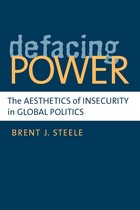
"Combining a rich and varied set of theoretical insights with a subtle analysis of the politics of American foreign policy, Defacing Power marks an important contribution toward understanding the power of identity in world politics. Engagingly written and rigorously argued, Steele's challenging analysis is incisive, important, and rewarding."
---Michael C. Williams, Graduate School of Public and International Affairs, University of Ottawa
"Brent Steele's marvelous excavation of the aesthetic dimensions of power is strikingly irreverent, inasmuch as he displays no commitment to ex ante disciplinary or substantive constraints in his quest to disclose those moments of creative action so often overlooked by theories and theorists wedded to the grandiose and the transhistorical. Steele samples and remixes a myriad of sources, arranging them so as to produce a transgressively insightful account of how 'work on the Self,' often condemned as self-indulgent by prior generations of intellectuals, might just point in the direction of a more sustainably secure world."
---Patrick Thaddeus Jackson, School of International Service, American University
"Defacing Power successfully integrates work from Dewey to Morgenthau to Foucault, as well as a wide range of contemporary international relations scholars, in its genealogy of power conceptualizations and characteristics. This book is theoretically sophisticated and serious. It should be of interest to students of international politics, international theory, social theory, and foreign policy."
---Cecelia Lynch, Center for Global Peace and Conflict Studies, University of California, Irvine
Defacing Power investigates how nation-states create self-images in part through aesthetics and how these images can be manipulated to challenge those states' power. Although states have long employed media, such as radio, television, and film, for their own image-making purposes, counterpower agents have also seized upon new telecommunications technologies. Most recently, the Internet has emerged as contested territory where states and other actors wage a battle of words and images.
Moving beyond theory, Brent Steele illustrates his provocative argument about the vulnerability of power with examples from recent history: the My Lai Massacre and the Tet Offensive, September 11 and the al-Qaeda communiqués, the atrocities at Fallujah and Abu Ghraib, and the U.S. response to the Asian tsunami of December 2004. He demonstrates how a nation-state---even one as powerful as the United States---comes to feel threatened not only by other nation-states or terrorist organizations but also by unexpected events that challenge its self-constructed image of security. At the same time, Steele shows that as each generation uses available media to create and re-create a national identity, technological innovations allow for the shifting, upheaval, and expansion of the cultural structure of a nation.
Brent J. Steele is Associate Professor of Political Science at the University of Kansas.
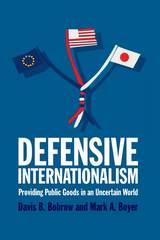
-Todd Sandler, Robert R. and Katheryn A. Dockson Professor of International Relations & Economics, University of Southern California
"Boyer and Bobrow's well-written, data-rich analysis of such pressing issues as development assistance, debt management, UN peacekeeping, and environmental protection makes Defensive Internationalism a highly original and provocative contribution to the study of global governance."
-Yale H. Ferguson, Co-Director, Center for Global Change and Governance, Rutgers University
In this pathbreaking study, authors Davis B. Bobrow and Mark A. Boyer argue for "muted optimism" about the future of international cooperation. Leaders of a growing movement that integrates constructivism into traditional international studies concepts and methods, Bobrow and Boyer analyze four key international issues: development cooperation, debt management, peacekeeping operations, and environmental affairs. Their approach integrates elements of public goods theory, identity theory, new institutionalism, and rational choice. Defensive Internationalism is a well-written, creative and coherent synthesis of ideas that have up to now been considered irreconcilable. It is appropriate for upper-level undergraduate and graduate students in international relations, conflict studies, and political economy, and promises to become a foundational work in its field.
Davis B. Bobrow is Professor of Public and International Affairs and Political Science at the University of Pittsburgh.
Mark A. Boyer is Professor of Political Science at the University of Connecticut.
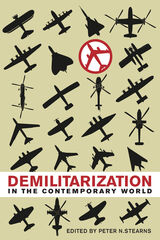
In nine insightful chapters, this volume's contributors outline each nation's demilitarization choices and how they were made. They investigate factors such as military defeat, border security risks, economic pressures, and the development of strong peace cultures among citizenry. Also at center stage is the influence of the United States, which fills a paradoxical role as both an enabler of demilitarization and a leader in steadily accelerating militarization.
Bookended by Peter N. Stearns' thought-provoking historical introduction and forward-looking conclusion, the chapters in this volume explore what true demilitarization means and how it impacts a society at all levels, military and civilian, political and private. The examples chosen reveal that successful demilitarization must go beyond mere troop demobilization or arms reduction to generate significant political and even psychological shifts in the culture at large. Exemplifying the political difficulties of demilitarization in both its failures and successes, Demilitarization in the Contemporary World provides a possible roadmap for future policies and practices.

In 2002, North Korea precipitated a major international crisis when it revealed the existence of a secret nuclear weapons program and announced its withdrawal from the Nuclear Nonproliferation Treaty. Earlier in the year, George W. Bush had declared North Korea part of the “axis of evil,” and soon afterward his administration listed the country as a potential target of a preemptive nuclear strike. Pyongyang’s angry reaction ensured the complete deterioration of relations on the Korean peninsula, where only two years before the leaders of North and South Korea had come together in a historic summit meeting.
Few international conflicts are as volatile, protracted, or seemingly insoluble as the one in Korea, where mutual mistrust, hostile Cold War attitudes, and the possibility of a North Korean economic collapse threaten the security of the entire region. For Roland Bleiker, this persistently recurring pattern suggests profound structural problems within and between the two Koreas that have not been acknowledged until now. Expanding the discussion beyond geopolitics and ideology, Bleiker places peninsular tensions in the context of an ongoing struggle over competing forms of Korean identity. Divided Korea examines both domestic and international attitudes toward Korean identity, the legacy of war, and the possibilities for-and anxieties about-unification.
Divided Korea challenges the prevailing logic of confrontation and deterrence, embarking on a fundamental reassessment of both the roots of the conflict and the means to achieve a more stable political environment and, ultimately, peace. In order to realize a lasting solution, Bleiker concludes, the two Koreas and the international community must first show a willingness to accept difference and contemplate forgiveness as part of a broader reconciliation process.
Roland Bleiker is professor of international relations at the University of Queensland. From 1986 to 1988 he served as chief of office for the Swiss delegation to the Neutral Nations Supervisory Commission in Panmunjom.
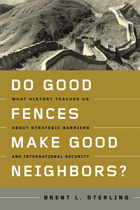
A number of nations, conspicuously Israel and the United States, have been increasingly attracted to the use of strategic barriers to promote national defense. In Do Good Fences Make Good Neighbors?, defense analyst Brent Sterling examines the historical use of strategic defenses such as walls or fortifications to evaluate their effectiveness and consider their implications for modern security.
Sterling studies six famous defenses spanning 2,500 years, representing both democratic and authoritarian regimes: the Long Walls of Athens, Hadrian’s Wall in Roman Britain, the Ming Great Wall of China, Louis XIV’s Pré Carré, France’s Maginot Line, and Israel’s Bar Lev Line. Although many of these barriers were effective in the short term, they also affected the states that created them in terms of cost, strategic outlook, military readiness, and relations with neighbors. Sterling assesses how modern barriers against ground and air threats could influence threat perceptions, alter the military balance, and influence the builder’s subsequent policy choices.
Advocates and critics of strategic defenses often bolster their arguments by selectively distorting history. Sterling emphasizes the need for an impartial examination of what past experience can teach us. His study yields nuanced lessons about strategic barriers and international security and yields findings that are relevant for security scholars and compelling to general readers.


During the Cold War, many believed that the superpowers shared a conception of strategic stability, a coexistence where both sides would compete for global influence but would be deterred from using nuclear weapons. In actuality, both sides understood strategic stability and deterrence quite differently. Today’s international system is further complicated by more nuclear powers, regional rivalries, and nonstate actors who punch above their weight, but the United States and other nuclear powers still cling to old conceptions of strategic stability.
The purpose of this book is to unpack and examine how different states in different regions view strategic stability, the use or non-use of nuclear weapons, and whether or not strategic stability is still a prevailing concept. The contributors to this volume explore policies of current and potential nuclear powers including the United States, Russia, China, India, Iran, Israel, Pakistan, and Saudi Arabia. This volume makes an important contribution toward understanding how nuclear weapons will impact the international system in the twenty-first century and will be useful to students, scholars, and practitioners of nuclear weapons policy.

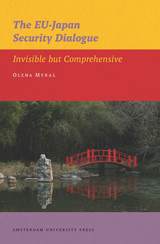
This volume examines the security dialogue between Japan and the European Union since the establishment of the official European Community-Japan cooperation efforts in the late 1950s. Olena Mykal investigates how international events—particularly the terrorist attacks in New York on 9/11 and the EU’s proposal to lift its arms embargo on China—have strengthened the dialogue over the past decade.
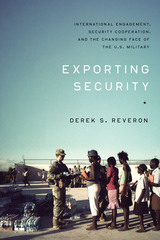
Given U.S. focus on the continuing wars in Iraq and Afghanistan, it is easy to miss that the military does much more than engage in combat. On any given day, military engineers dig wells in East Africa, medical personnel provide vaccinations in Latin America, and special forces mentor militaries in southeast Asia.
To address today's security challenges, the military partners with civilian agencies, NGOs, and the private sector both at home and abroad. By doing so, the United States seeks to improve its international image, strengthen the state sovereignty system by training and equipping partners’ security forces, prevent localized violence from escalating into regional crises, and protect U.S. national security by addressing underlying conditions that inspire and sustain violent extremism.
In Exporting Security, Derek Reveron provides a comprehensive analysis of the shift in U.S. foreign policy from coercive diplomacy to cooperative military engagement, examines how and why the U.S. military is an effective tool of foreign policy, and explores the methods used to reduce security deficits around the world.
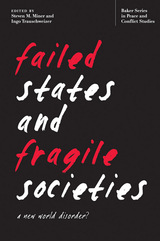
Since the end of the Cold War, a new dynamic has arisen within the international system, one that does not conform to established notions of the state’s monopoly on war. In this changing environment, the global community must decide how to respond to the challenges posed to the state by military threats, political and economic decline, and social fragmentation. This insightful work considers the phenomenon of state failure and asks how the international community might better detect signs of state decay at an early stage and devise legally and politically legitimate responses.
This collection of essays brings military and social historians into conversation with political and social scientists and former military officers. In case studies from the former Yugoslavia, Somalia, Iraq, and Colombia, the distinguished contributors argue that early intervention to stabilize social, economic, and political systems offers the greatest promise, whereas military intervention at a later stage is both costlier and less likely to succeed.
Contributors: David Carment, Yiagadeesen Samy, David Curp, Jonathan House, James Carter, Vanda Felbab-Brown, Robert Rotberg, and Ken Menkhaus.

Are NATO’s mutual security commitments strong enough today to deter all adversaries? Is the nuclear umbrella as credible as it was during the Cold War? Backed by the full range of US and allied military capabilities, NATO’s mutual defense treaty has been enormously successful, but today’s commitments are strained by military budget cuts and antinuclear sentiment. The United States has also shifted its focus away from European security during the wars in Afghanistan and Iraq and more recently with the Asia rebalance. Will a resurgent Russia change this?
The Future of Extended Deterrence brings together experts and scholars from the policy and academic worlds to provide a theoretically rich and detailed analysis of post–Cold War nuclear weapons policy, nuclear deterrence, alliance commitments, nonproliferation, and missile defense in NATO but with implications far beyond. The contributors analyze not only American policy and ideas but also the ways NATO members interpret their own continued political and strategic role in the alliance.
In-depth and multifaceted, The Future of Extended Deterrence is an essential resource for policy practitioners and scholars of nuclear deterrence, arms control, missile defense, and the NATO alliance.
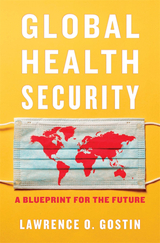
With lessons learned from COVID-19, a world-leading expert on pandemic preparedness proposes a pragmatic plan urgently needed for the future of global health security.
The COVID-19 pandemic revealed how unprepared the world was for such an event, as even the most sophisticated public health systems failed to cope. We must have far more investment and preparation, along with better detection, warning, and coordination within and across national boundaries. In an age of global pandemics, no country can achieve public health on its own. Health security planning is paramount.
Lawrence O. Gostin has spent three decades designing resilient health systems and governance that take account of our interconnected world, as a close advisor to the Centers for Disease Control and Prevention (CDC), the World Health Organization (WHO), and many public health agencies globally. Global Health Security addresses the borderless dangers societies now face, including infectious diseases and bioterrorism, and examines the political, environmental, and socioeconomic factors exacerbating these threats. Weak governance, ineffective health systems, and lack of preparedness are key sources of risk, and all of them came to the fore during the COVID-19 crisis, even—sometimes especially—in wealthy countries like the United States. But the solution is not just to improve national health policy, which can only react after the threat is realized at home. Gostin further proposes robust international institutions, tools for effective cross-border risk communication and action, and research programs targeting the global dimension of public health.
Creating these systems will require not only sustained financial investment but also shared values of cooperation, collective responsibility, and equity. Gostin has witnessed the triumph of these values in national and international forums and has a clear plan to tackle the challenges ahead. Global Health Security therefore offers pragmatic solutions that address the failures of the recent past, while looking toward what we know is coming. Nothing could be more important to the future health of nations.
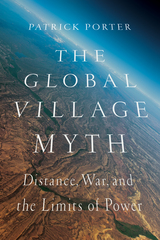
According to security elites, revolutions in information, transport, and weapons technologies have shrunk the world, leaving the United States and its allies more vulnerable than ever to violent threats like terrorism or cyberwar. As a result, they practice responses driven by fear: theories of falling dominoes, hysteria in place of sober debate, and an embrace of preemptive war to tame a chaotic world.
Patrick Porter challenges these ideas. In The Global Village Myth, he disputes globalism's claims and the outcomes that so often waste blood and treasure in the pursuit of an unattainable "total" security. Porter reexamines the notion of the endangered global village by examining Al-Qaeda's global guerilla movement, military tensions in the Taiwan Strait, and drones and cyberwar, two technologies often used by globalists to support their views. His critique exposes the folly of disastrous wars and the loss of civil liberties resulting from the globalist enterprise. Showing that technology expands rather than shrinks strategic space, Porter offers an alternative outlook to lead policymakers toward more sensible responses—and a wiser, more sustainable grand strategy.
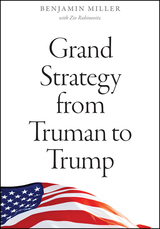
American foreign policy is the subject of extensive debate. Many look to domestic factors as the driving forces of bad policies. Benjamin Miller instead seeks to account for changes in US international strategy by developing a theory of grand strategy that captures the key security approaches available to US decision-makers in times of war and peace.
Grand Strategy from Truman to Trump makes a crucial contribution to our understanding of competing grand strategies that accounts for objectives and means of security policy. Miller puts forward a model that is widely applicable, based on empirical evidence from post-WWII to today, and shows that external factors—rather than internal concerns—are the most determinative.

The optimism that arrived at the end of the cold war and marked the turn of the Millennium was shattered by September 11. In the aftermath of that event it is not unwarranted pessimism that lines the pages of Grave New World, it is unavoidable reality. Terrorism is but one aspect of many other wider concerns for national and international security, and the contributors to this volume not only warn us, but reward us as well with the clarity of their views into—and possible solutions for—a difficult, complicated future. They speak convincingly of the numerous military and non-military challenges that create security problems—whether those are interstate, intrastate, or transnational—many of which are being dangerously overlooked in public policy debates.
The challenges and complexities might seem insurmountable but the first step in solving problems is recognizing that they exist. Grave New World provides an eye-opening assessment of the prospects for peace and security in the 21st century.
Michael E. Brown frames these issues in his Introduction, "Security Challenges in the 21st Century;" and in his summation, "Security Problems and Security Policy in a Grave New World."

By combining these different analyses, Greenland in Arctic Security provides new, theoretically informed discussions on how security politics can manifest across different scales and territorial borders. At times, these politics can have consequences beyond their original intent. With Greenland geopolitics and securitization theory of current interest to political and academic debates, this book offers timely insights for readers.
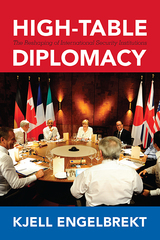
The proliferation of “minilateral” summits is reshaping how international security problems are addressed, yet these summits remain a poorly understood phenomenon. In this groundbreaking work, Kjell Engelbrekt contrasts the most important minilateral summits—the G7 (formerly G8) and G20—with the older and more formal UN Security Council to assess where the diplomacy of international security is taking place and whether these institutions complement or compete with each other.
Engelbrekt’s research in primary-source documents of the G7, G8, G20, and UN Security Council provides unique insight into how these institutions deliberate on three policy areas: conflict management, counterterrorism cooperation, and climate change mitigation. Relatively informal and flexible, GX diplomacy invites more countries to take a seat at the table and allows nontraditional security threats to be placed on the agenda. Engelbrekt concludes, however, that there is a continuing need for institutions like the UN to address traditional security problems.
High-Table Diplomacy will provoke discussion and further research on the role of minilateral summits among scholars of international relations, security studies, and international organizations.

The decade of the 1990s witnessed enormous changes in the international environment. The Cold War conclusively ended. Biotechnology and communications technology made rapid advances. Barriers to international trade and investment declined. Taken together, these developments created many opportunities for peace and prosperity.
At the same time, with the end of superpower domination, ethnically based intranational conflicts brought on widespread suffering. And while globalization expanded opportunity, growth, and incomes, it increased inequality of incomes and decreased human security. Moreover, as countries have become more closely linked, insecurity in one country has affected security in other countries.
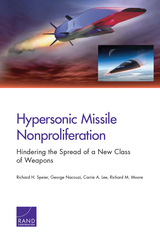
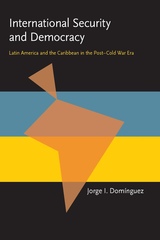
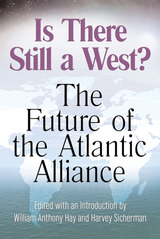

When Losing Control was first published a decade ago it was years ahead of its time. Its argument was simple - the real causes of global insecurity were the widening socio-economic divide, global marginalisation and environmental limitations, especially climate change and conflict over energy resources.
Paul Rogers, one of the most original thinkers on international security, pointed to a world in which irregular warfare from the margins would prevent powerful states from maintaining their position. He even predicted accurately how the United States would respond to a catastrophic attack.
The new edition brings the whole analysis right up to date, arguing persuasively that the world’s elite cannot maintain control and that a far more emancipatory and sustainable approach to global security has to be developed.
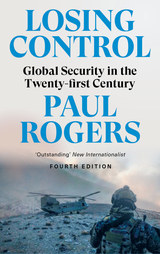
'Outstanding ... combines a glimpse behind the security screens with a sharp analysis of the real global insecurities - growing inequality and unsustainability' - New Internationalist
Written in the late 1990s, Losing Control was years, if not decades, ahead of its time, predicting the 9/11 attacks, a seemingly endless war on terror and the relentless increase in revolts from the margins and bitter opposition to wealthy elites.
Now, more than two decades later and in an era of pandemics, climate breakdown and potential further military activity in the Middle East, Asia and Africa, Paul Rogers has revised and expanded the original analysis, pointing to the 2030s and '40s as the decades that will see a showdown between a bitter, environmentally wrecked and deeply insecure world and a possible world order rooted in justice and peace.
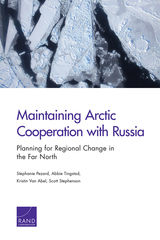
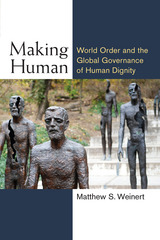
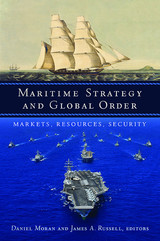
Taken for granted as the natural order of things, peace at sea is in fact an immense and recent achievement—but also an enormous strategic challenge if it is to be maintained in the future. In Maritime Strategy and Global Order, an international roster of top scholars offers historical perspectives and contemporary analysis to explore the role of naval power and maritime trade in creating the international system.
The book begins in the early days of the industrial revolution with the foundational role of maritime strategy in building the British Empire. It continues into the era of naval disorder surrounding the two world wars, through the passing of the Pax Britannica and the rise of the Pax Americana, and then examines present-day regional security in hot spots like the South China Sea and Arctic Ocean. Additional chapters engage with important related topics such as maritime law, resource competition, warship evolution since the end of the Cold War, and naval intelligence.
A first-of-its-kind collection, Maritime Strategy and Global Order offers scholars, practitioners, students, and others with an interest in maritime history and strategic issues an absorbing long view of the role of the sea in creating the world we know.
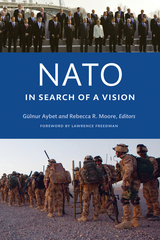
As the NATO Alliance enters its seventh decade, it finds itself involved in an array of military missions ranging from Afghanistan to Kosovo to Sudan. It also stands at the center of a host of regional and global partnerships. Yet, NATO has still to articulate a grand strategic vision designed to determine how, when, and where its capabilities should be used, the values underpinning its new missions, and its relationship to other international actors such as the European Union and the United Nations.
The drafting of a new strategic concept, begun during NATO’s 60th anniversary summit, presents an opportunity to shape a new transatlantic vision that is anchored in the liberal democratic principles so crucial to NATO’s successes during its Cold War years. Furthermore, that vision should be focused on equipping the Alliance to anticipate and address the increasingly global and less predictable threats of the post-9/11 world.
This volume brings together scholars and policy experts from both sides of the Atlantic to examine the key issues that NATO must address in formulating a new strategic vision. With thoughtful and reasoned analysis, it offers both an assessment of NATO’s recent evolution and an analysis of where the Alliance must go if it is to remain relevant in the twenty-first century.

NATO’s 2010 Strategic Concept officially broadened the alliance’s mission beyond collective defense, reflecting a peaceful Europe and changes in alliance activities. NATO had become an international security facilitator, a crisis-manager even outside Europe, and a liberal democratic club as much as a mutual-defense organization. However, Russia’s re-entry into great power politics has changed NATO’s strategic calculus.
Russia’s aggressive annexation of Crimea in 2014 and its ongoing military support for Ukrainian separatists dramatically altered the strategic environment and called into question the liberal European security order. States bordering Russia, many of which are now NATO members, are worried, and the alliance is divided over assessments of Russia’s behavior. Against the backdrop of Russia’s new assertiveness, an international group of scholars examines a broad range of issues in the interest of not only explaining recent alliance developments but also making recommendations about critical choices confronting the NATO allies. While a renewed emphasis on collective defense is clearly a priority, this volume’s contributors caution against an overcorrection, which would leave the alliance too inwardly focused, play into Russia’s hand, and exacerbate regional fault lines always just below the surface at NATO. This volume places rapid-fire events in theoretical perspective and will be useful to foreign policy students, scholars, and practitioners alike.

Trends in the number and scope of peace operations since 2000 evidence heightened international appreciation for their value in crisis-response and regional stabilization. Peace Operations: Trends, Progress, and Prospects addresses national and institutional capacities to undertake such operations, by going beyond what is available in previously published literature.
Part one focuses on developments across regions and countries. It builds on data- gathering projects undertaken at Georgetown University's Center for Peace and Security Studies (CPASS), the Stockholm International Peace Research Institute (SIPRI), and the Folke Bernadotte Academy (FBA) that offer new information about national contributions to operations and about the organizations through which they make those contributions. The information provides the bases for arriving at unique insights about the characteristics of contributors and about the division of labor between the United Nations and other international entities.
Part two looks to trends and prospects within regions and nations. Unlike other studies that focus only on regions with well-established track records—specifically Europe and Africa—this book also looks to the other major areas of the world and poses two questions concerning them: If little or nothing has been done institutionally in a region, why not? What should be expected?
This groundbreaking volume will help policymakers and academics understand better the regional and national factors shaping the prospects for peace operations into the next decade.
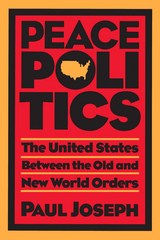

Exemplary of this new approach were Western responses to ethnic cleansing in the former Yugoslavia and genocide in Rwanda. In order to avoid costly interventions, U.S. and European leaders traced these crimes to ancient tribal enmities and professed that the role of the international community should be limited to a humanitarian, impartial, and conciliatory engagement with all the warring parties. They thus managed to appear righteous but powerless, at least until NATO’s intervention in Kosovo. Faced with this doctrine, both the liberal and radical wings of the Western Left found themselves in an uneasy position. Liberals, while lured by their leaders’ humanitarianism were nonetheless disturbed by the dismal results of the policies carried out in the name of the international community. Conversely, anti-imperialist militants were quick to mock the hypocrisy of their governments’ helpless indignation, yet certainly not prepared to demand that Western powers resort to force.
Are we still in this “age of the international community”? Feher shows that with NATO’s intervention in Kosovo, both liberal and radical activists suddenly found their mark: the former welcomed the newfound resolve of their governments, while the latter condemned it as the return of the imperialist “new world order.” For Western leaders, however, the war against Serbia proved an accident rather than a turning point. Indeed, less than a year later, their indifference to the destruction of Chechnya by Russian troops suggested that the discursive strategy exposed in Powerless by Design might remain with us for quite some time.
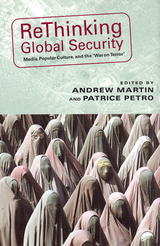
Analysts today routinely look toward the media and popular culture as a way of understanding global security. Although only a decade ago, such a focus would have seemed out of place, the proliferation of digital technologies in the twenty-first century has transformed our knowledge of near and distant events so that it has become impossible to separate the politics of war, suffering, terrorism, and security from the practices and processes of the media.
This book brings together ten path-breaking essays that explore the ways our notions of fear, insecurity, and danger are fostered by intermediary sources such as television, radio, film, satellite imaging, and the Internet. The contributors, from a wide range of disciplines, show how both fictional and fact-based threats to global security have helped to create and sustain a culture that is deeply distrustful. Topics range from the Patriot Act, to the censorship of media personalities, to the role that television programming plays as an interpretative frame for current events.
Designed to promote strategic thinking about the relationships between media, popular culture, and global security, this book is essential reading for scholars of international relations, technology, and media studies.
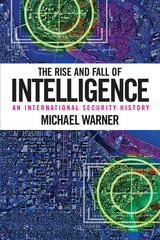
This sweeping history of the development of professional, institutionalized intelligence examines the implications of the fall of the state monopoly on espionage today and beyond.
During the Cold War, only the alliances clustered around the two superpowers maintained viable intelligence endeavors, whereas a century ago, many states could aspire to be competitive at these dark arts. Today, larger states have lost their monopoly on intelligence skills and capabilities as technological and sociopolitical changes have made it possible for private organizations and even individuals to unearth secrets and influence global events.
Historian Michael Warner addresses the birth of professional intelligence in Europe at the beginning of the twentieth century and the subsequent rise of US intelligence during the Cold War. He brings this history up to the present day as intelligence agencies used the struggle against terrorism and the digital revolution to improve capabilities in the 2000s. Throughout, the book examines how states and other entities use intelligence to create, exploit, and protect secret advantages against others, and emphasizes how technological advancement and ideological competition drive intelligence, improving its techniques and creating a need for intelligence and counterintelligence activities to serve and protect policymakers and commanders.
The world changes intelligence and intelligence changes the world. This sweeping history of espionage and intelligence will be a welcomed by practitioners, students, and scholars of security studies, international affairs, and intelligence, as well as general audiences interested in the evolution of espionage and technology.
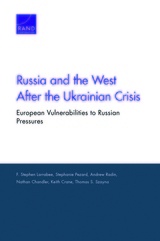
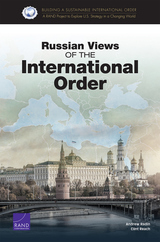

Among the most momentous decisions that leaders of a state are called upon to make is whether or not to initiate warfare. How their military will fare against the opponent may be the first consideration, but not far behind are concerns about domestic political response and the reaction of the international community.
Securing Approval makes clear the relationship between these two seemingly distinct concerns, demonstrating how multilateral security organizations like the UN influence foreign policy through public opinion without ever exercising direct enforcement power. While UN approval of a proposed action often bolsters public support, its refusal of endorsement may conversely send a strong signal to domestic audiences that the action will be exceedingly costly or overly aggressive. With a cogent theoretical and empirical argument, Terrence L. Chapman provides new evidence for how multilateral organizations matter in security affairs as well as a new way of thinking about the design and function of these institutions.
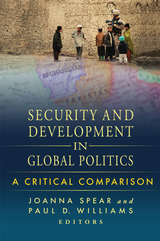
Security and development matter: they often involve issues of life and death and they determine the allocation of truly staggering amounts of the world’s resources. Particularly since the start of the wars in Afghanistan and Iraq, there has been momentum in policy circles to merge the issues of security and development to attempt to end conflicts, create durable peace, strengthen failing states, and promote the conditions necessary for people to lead healthier and more prosperous lives.
In many ways this blending of security and development agendas seems admirable and designed to produce positive outcomes all around. However, it is often the case that the two concepts in combination do not receive equal weight, with security issues getting priority over development concerns. This is not desirable and actually undermines security in the longer term. Moreover, there are major challenges in practice when security practitioners and development practitioners are asked to agree on priorities and work together.
Security and Development in Global Politics illuminates the common points of interest but also the significant differences between security and development agendas and approaches to problem solving. With insightful chapter pairings—each written by a development expert and a security analyst—the book explores seven core international issues: aid, humanitarian assistance, governance, health, poverty, trade and resources, and demography. Using this comparative structure, the book effectively assesses the extent to which there really is a nexus between security and development and, most importantly, whether the link should be encouraged or resisted.
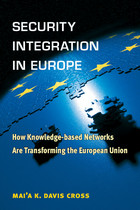
At a time when many observers question the EU’s ability to achieve integration of any significance, and indeed Europeans themselves appear disillusioned, Mai’a K. Davis Cross argues that the EU has made remarkable advances in security integration, in both its external and internal dimensions. Moreover, internal security integration—such as dealing with terrorism, immigration, cross-border crime, and drug and human trafficking—has made even greater progress with dismantling certain barriers that previously stood at the core of traditional state sovereignty.
Such unprecedented collaboration has become possible thanks to knowledge-based transnational networks, or “epistemic communities,” of ambassadors, military generals, scientists, and other experts who supersede national governments in the diplomacy of security decision making and are making headway at remarkable speed by virtue of their shared expertise, common culture, professional norms, and frequent meetings. Cross brings together nearly 80 personal interviews and a host of recent government documents over the course of five separate case studies to provide a microsociological account of how governance really works in today’s EU and what future role it is likely to play in the international environment.
“This is an ambitious work which deals not only with European security and defense but also has much to say about the policy-making process of the EU in general.”
—Ezra Suleiman, Princeton University
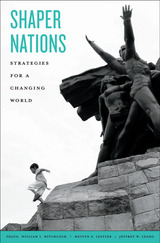
Shaper Nations provides illuminating perspectives on the national strategies of eight emerging and established countries that are shaping global politics at the beginning of the twenty-first century. The volume’s authors offer a unique viewpoint: they live and work primarily in the country about which they write, bringing an insider’s feel for national debates and politics.
The conventional wisdom on national strategy suggests that these states have clear central authority, coherently connect means to ends, and focus on their geopolitical environment. These essays suggest a different conclusion. In seven key countries—Brazil, China, Germany, India, Israel, Russia, and Turkey—strategy is dominated by nonstate threats, domestic politics, the distorting effect of history and national identity, economic development concerns, and the sheer difficulty, in the face of many powerful internal and external constraints, of pursuing an effective national strategy.
The shapers represent a new trend in the international arena with important consequences. Among them is a more uncertain world in which countries concentrate on their own development rather than on shared problems that might divert precious resources, and attend more to regional than to global order. In responding to these shaper states, the United States must understand the sources of their national strategies in determining its own role on the global stage.
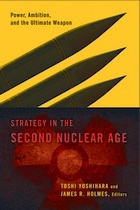
A “second nuclear age” has begun in the post-Cold War world. Created by the expansion of nuclear arsenals and new proliferation in Asia, it has changed the familiar nuclear geometry of the Cold War. Increasing potency of nuclear arsenals in China, India, and Pakistan, the nuclear breakout in North Korea, and the potential for more states to cross the nuclear-weapons threshold from Iran to Japan suggest that the second nuclear age of many competing nuclear powers has the potential to be even less stable than the first.
Strategy in the Second Nuclear Age assembles a group of distinguished scholars to grapple with the matter of how the United States, its allies, and its friends must size up the strategies, doctrines, and force structures currently taking shape if they are to design responses that reinforce deterrence amid vastly more complex strategic circumstances. By focusing sharply on strategy—that is, on how states use doomsday weaponry for political gain—the book distinguishes itself from familiar net assessments emphasizing quantifiable factors like hardware, technical characteristics, and manpower. While the emphasis varies from chapter to chapter, contributors pay special heed to the logistical, technological, and social dimensions of strategy alongside the specifics of force structure and operations. They never lose sight of the human factor—the pivotal factor in diplomacy, strategy, and war.
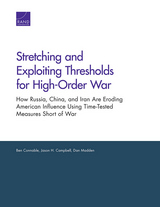
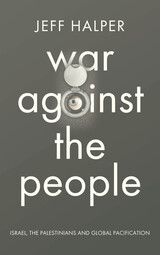
Halper goes on to show how this method of war is rapidly globalizing, as the major capitalist powers and corporations transform militaries, security agencies, and police forces into an effective instrument of global pacification. Simultaneously a deeply researched exposé and a clarion call, War Against the People is a bold attempt to shine the light on the daily injustices visited on a civilian population —and thus hasten their end.
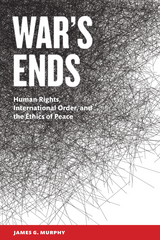
Before military action, and even before mobilization, the decision on whether to go to war is debated by politicians, pundits, and the public. As they address the right or wrong of such action, it is also a time when, in the language of the just war tradition, the wise would deeply investigate their true claim to jus ad bellum (“the right of war”). Wars have negative consequences, not the least impinging on human life, and offer infrequent and uncertain benefits, yet war is part of the human condition.
James G. Murphy’s insightful analysis of the jus ad bellum criteria—competent authority, just cause, right intention, probability of success, last resort, and proportionality—is grounded in a variety of contemporary examples from World War I through Vietnam, the "soccer war" between Honduras and El Salvador, Afghanistan, and the Middle East conflict. Murphy argues persuasively that understanding jus ad bellum requires a primary focus on the international common good and the good of peace. Only secondarily should the argument about going to war hinge on the right of self-defense; in fact, pursuing the common good requires political action, given that peace is not simply the absence of violence. He moves on to demonstrate the interconnectedness of the jus ad bellum criteria, contending that some criteria depend logically on others—and that competent authority, not just cause, is ultimately the most significant criterion in an analysis of going to war. This timely study will be of special interest to scholars and students in ethics, war and peace, and international affairs.
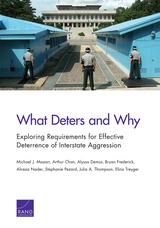
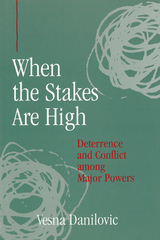
Since the most precarious and common form of dispute between major powers arises over third nations, the author's primary focus is on so-called extended deterrence. In this type of deterrence, one side attempts to prevent another side from initiating or escalating conflict with a third nation. When the Stakes Are High addresses such questions as: When is extended deterrence likely to be effective? What happens if deterrence fails? In what circumstances is war likely to result from a deterrence failure? The author's main argument is that a major power's national interests, which shape the inherent credibility of threats and which are shaped by various regional stakes, set the limits to the relevance of other factors, which have received greater scholarly attention in the past. Strongly supported by the empirical findings, the arguments in this work draw important implications for conflict theory and deterrence policy in the post-Cold War era.
This book will appeal to the reader interested in international relations, in general, and in theories of international conflict, deterrence, causes of wars, great power behavior, and geopolitics, in particular.
Vesna Danilovic is Assistant Professor of Political Science, Texas A&M University.

On November 10, 2017, Pope Francis became the first pontiff in the nuclear era to take a complete stand against nuclear weapons, even as a form of deterrence. At a Vatican conference of leaders in the field of disarmament, he made it clear that the possession of the bomb itself was immoral. A World Free from Nuclear Weapons presents the pope’s address and original testimony from Nobel Peace Prize laureates, religious leaders, diplomats, and civil society activists.
These luminaries, which include the pope and a Hiroshima survivor, make the moral case against possessing, manufacturing, and deploying nuclear arms. Drew Christiansen, a member of the Holy See delegation to the 2017 United Nations conference that negotiated the Treaty to Prohibit Nuclear Weapons, helps readers to understand this conference in its historical context.
A World Free from Nuclear Weapons is a critical companion for scholars of modern Catholicism, moral theology, and peace studies, as well as policymakers working on effective disarmament. It shows how the Church’s revised position presents an opportunity for global leaders to connect disarmament to larger movements for peace, pointing toward future action.
READERS
Browse our collection.
PUBLISHERS
See BiblioVault's publisher services.
STUDENT SERVICES
Files for college accessibility offices.
UChicago Accessibility Resources
home | accessibility | search | about | contact us
BiblioVault ® 2001 - 2024
The University of Chicago Press




